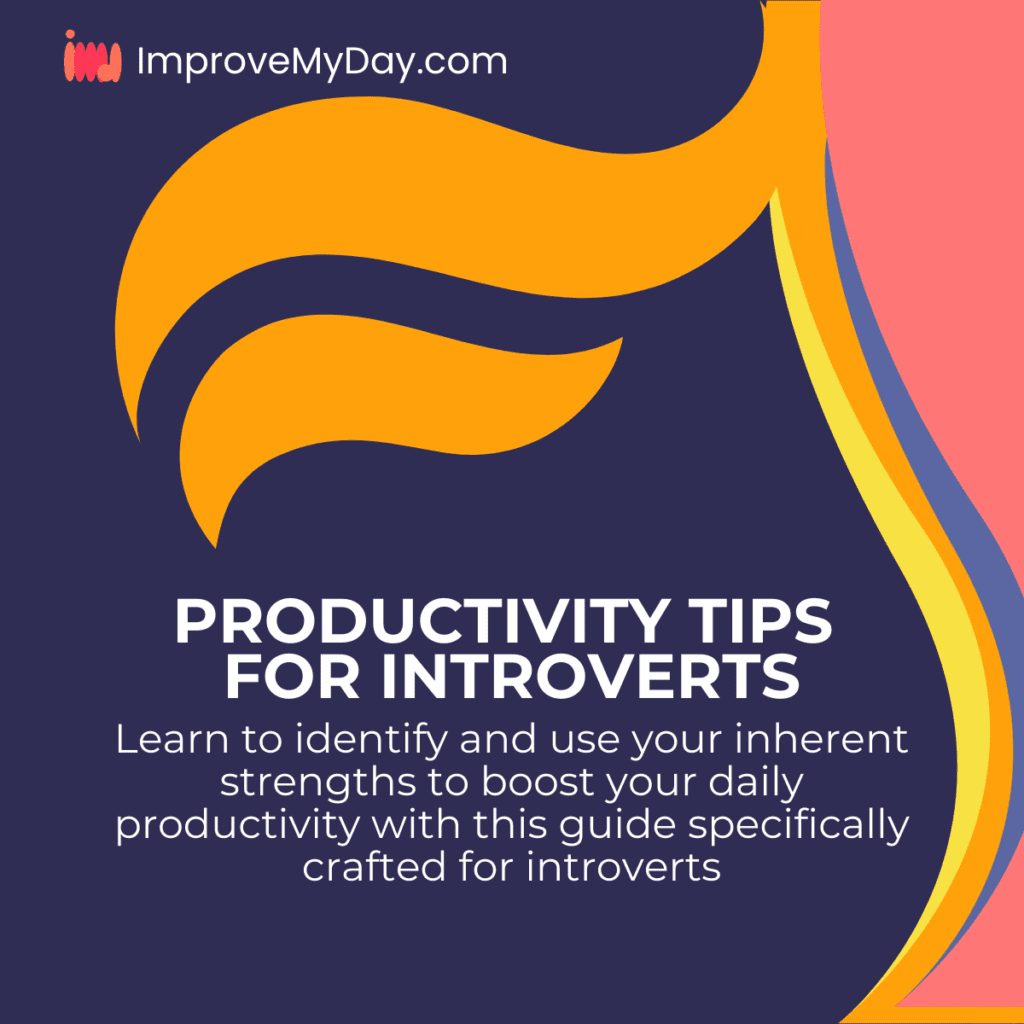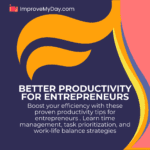In a world that often celebrates extroversion, introverts possess unique strengths that can lead to exceptional productivity. By understanding and leveraging these inherent qualities, introverted individuals can not only match but often surpass the output of their more outgoing counterparts. This article explores practical productivity tips for introverts, helping you harness your natural abilities and create a work environment that allows you to thrive.
Understanding Introversion and Productivity
Introversion is not a weakness or a flaw—it’s simply a different way of interacting with the world. Introverts tend to draw energy from solitude and lose energy in highly stimulating environments. This fundamental aspect of introversion has significant implications for productivity.
According to Susan Cain, author of “Quiet: The Power of Introverts in a World That Can’t Stop Talking,” introverts make up 30-50% of the population. Despite this substantial representation, many work environments are designed with extroverts in mind. Understanding your introverted nature is the first step toward maximizing your productivity.
Harnessing Introverted Strengths
Introverts possess several strengths that can be leveraged for enhanced productivity:
1. Deep Focus and Concentration
Introverts often excel at deep, focused work. This ability to concentrate intensely for extended periods is a superpower in today’s distraction-filled world.
Tip: Schedule blocks of uninterrupted time for deep work. During these periods, silence notifications and find a quiet space to maximize your concentration.
2. Thoughtful Analysis and Problem-Solving
Introverts tend to process information deeply before responding. This thoughtful approach can lead to more thorough analysis and creative problem-solving.
Tip: When faced with a complex problem, allow yourself time to reflect before responding. This “incubation period” often leads to more innovative solutions.
3. Creative Thinking in Solitude
Many introverts find that their most creative ideas emerge during periods of solitude. This aligns with research suggesting that solitude can enhance creative thinking.
Tip: Regularly schedule alone time for brainstorming and ideation. This could be a daily walk, a quiet hour in the morning, or a dedicated “thinking day” each month.
Creating an Optimal Work Environment
Your physical environment plays a crucial role in your productivity as an introvert. Here’s how to optimize your workspace:
1. Design a Quiet, Distraction-Free Area
Introverts often thrive in low-stimulation environments. Create a workspace that minimizes distractions and allows for focused work.
Tip: If you work in an open office, use noise-canceling headphones or find quiet nooks for concentrated work. At home, designate a specific area for work that’s separate from living spaces.
2. Manage Sensory Input
Introverts can be more sensitive to environmental stimuli. Pay attention to lighting, temperature, and ambient noise in your workspace.
Tip: Use natural light when possible, maintain a comfortable temperature, and consider using white noise or soft background music to mask disruptive sounds.
Time and Energy Management for Introverts
Effective time management for introverts is as much about managing energy as it is about managing time.
1. Understand Your Energy Patterns
Recognize when you’re most energized and productive. For many introverts, this is often in the morning or late at night when social interactions are minimal.
Tip: Schedule your most important or challenging tasks during your peak energy periods.
2. Implement the “Pomodoro Technique” with a Twist
The Pomodoro Technique involves working in focused 25-minute intervals followed by short breaks. For introverts, longer work periods might be more effective.
Tip: Experiment with 50-minute focused work sessions followed by 10-minute breaks. Use the breaks for solitary activities that help you recharge.
3. Build in Recharge Time
Social interactions, while necessary, can be draining for introverts. It’s crucial to build in time to recharge after meetings or collaborative work.
Tip: After a meeting or social event, schedule 15-30 minutes of alone time to decompress and refocus.
Effective Communication Strategies
Communication is essential in any workplace, but it can be energy-intensive for introverts. Here are strategies to communicate effectively while preserving your energy:
1. Leverage Written Communication
Many introverts excel at written communication. Use this strength to your advantage.
Tip: When possible, use email, instant messaging, or collaborative documents to communicate ideas clearly and thoroughly.
2. Prepare for Verbal Communications
When verbal communication is necessary, preparation can help you feel more comfortable and articulate.
Tip: Before meetings or presentations, jot down key points you want to make. This can help you feel more confident and ensure you convey your ideas effectively.
3. Practice Active Listening
Introverts often have a natural ability to listen attentively. Use this skill to your advantage in meetings and one-on-one conversations.
Tip: Focus on asking thoughtful questions and providing insightful comments based on what you’ve heard. This approach allows you to contribute valuably without dominating the conversation.
Networking and Collaboration
Networking and collaboration are important aspects of professional life, but they can be challenging for introverts. Here’s how to approach these activities in a way that works for you:
1. Focus on Quality Over Quantity
Instead of trying to meet as many people as possible at networking events, focus on having a few meaningful conversations.
Tip: Set a manageable goal for yourself, such as having two in-depth conversations at an event, rather than trying to work the entire room.
2. Utilize Online Platforms
Online networking can be less draining for introverts and allows for more controlled interactions.
Tip: Engage in professional forums, contribute to industry blogs, or participate in virtual networking events. These platforms allow you to showcase your expertise and make connections in a more comfortable setting.
3. Embrace One-on-One Interactions
Many introverts prefer one-on-one conversations to large group interactions. Use this preference to build stronger professional relationships.
Tip: Instead of large team meetings, suggest breaking into smaller groups or having individual check-ins when appropriate.
Self-Care and Stress Management
Maintaining productivity as an introvert requires intentional self-care and stress management.
1. Recognize and Respect Your Limits
Understanding and respecting your social and energy limits is crucial for long-term productivity and well-being.
Tip: Learn to say no to non-essential commitments that may drain your energy. Prioritize activities that align with your goals and values.
2. Practice Mindfulness and Reflection
Mindfulness and reflection can help introverts process experiences and recharge.
Tip: Incorporate mindfulness practices into your daily routine, such as meditation, journaling, or simply taking a few minutes of quiet reflection time.
3. Create Boundaries
Clear boundaries between work and personal life are essential for introverts to recharge and maintain productivity.
Tip: Establish specific work hours and communicate these to colleagues. Use technology to support these boundaries, such as setting “do not disturb” times on your devices.
Conclusion
Introversion, when understood and leveraged effectively, can be a powerful asset in the pursuit of productivity. By creating an environment that supports your introverted nature, managing your energy wisely, and communicating in ways that play to your strengths, you can achieve remarkable levels of productivity and professional success.
Remember, the goal isn’t to change your introverted nature, but to work with it. Embrace your strengths, respect your needs, and watch your productivity soar. In the words of Susan Cain, “Everyone shines, given the right lighting.” For introverts, that often means creating the conditions that allow for deep thought, focused work, and meaningful contributions.
By implementing these productivity tips for introverts, you’re not just working harder—you’re working smarter, in a way that aligns with your natural inclinations and strengths. Embrace your introversion, and let it be the catalyst for your most productive and fulfilling work yet.



